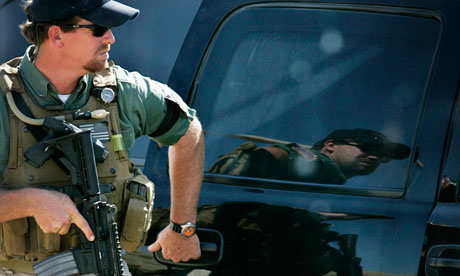 Early last year, after six hard months soldiering in Afghanistan, a group of American infantrymen reached a momentous decision: It was finally time to kill a haji.
Early last year, after six hard months soldiering in Afghanistan, a group of American infantrymen reached a momentous decision: It was finally time to kill a haji.
Among the men of Bravo Company, the notion of killing an Afghan civilian had been the subject of countless conversations, during lunchtime chats and late-night bull sessions. For weeks, they had weighed the ethics of bagging "savages" and debated the probability of getting caught.

 War Glance
War Glance In February 2006, with roadside bombs killing more and more American soldiers in Iraq, the Pentagon created an agency to defeat the deadly threat and tasked a retired four-star general to run it.
In February 2006, with roadside bombs killing more and more American soldiers in Iraq, the Pentagon created an agency to defeat the deadly threat and tasked a retired four-star general to run it.

 In the first 24 hours of the Libyan attack, US B-2s dropped forty-five 2,000-pound bombs. These massive bombs, along with the Cruise missiles launched from British and French planes and ships, all contained depleted uranium (DU) warheads.
In the first 24 hours of the Libyan attack, US B-2s dropped forty-five 2,000-pound bombs. These massive bombs, along with the Cruise missiles launched from British and French planes and ships, all contained depleted uranium (DU) warheads.
 While much of the media presents an unquestioning, sanitized version of the war - cable news hosts more focused on interviewing retired generals about America's fancy killing machines than the actual, bloody facts on the ground - the truth is that wars, even liberal-minded "humanitarian" ones, entail destroying people and places. Though cloaked in altruism that would be more believable were we dealing with monasteries, not nation-states, the war in Libya is no different. And innocents pay the price.
While much of the media presents an unquestioning, sanitized version of the war - cable news hosts more focused on interviewing retired generals about America's fancy killing machines than the actual, bloody facts on the ground - the truth is that wars, even liberal-minded "humanitarian" ones, entail destroying people and places. Though cloaked in altruism that would be more believable were we dealing with monasteries, not nation-states, the war in Libya is no different. And innocents pay the price. Blackwater looks set to survive an Afghan government clampdown on mercenaries after Hamid Karzai was forced by his western partners to abandon a complete disbandment of private security companies.
Blackwater looks set to survive an Afghan government clampdown on mercenaries after Hamid Karzai was forced by his western partners to abandon a complete disbandment of private security companies.






























